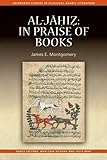Al-Jahiz : In Praise of Books / James E. Montgomery.
Material type: TextSeries: Edinburgh Studies in Classical Arabic Literature : ESCALPublisher: Edinburgh : Edinburgh University Press, [2021]Copyright date: ©2013Description: 1 online resource (592 p.)Content type:
TextSeries: Edinburgh Studies in Classical Arabic Literature : ESCALPublisher: Edinburgh : Edinburgh University Press, [2021]Copyright date: ©2013Description: 1 online resource (592 p.)Content type: - 9780748683321
- 9780748683338
- 892.7
- online - DeGruyter
- Issued also in print.
| Item type | Current library | Call number | URL | Status | Notes | Barcode | |
|---|---|---|---|---|---|---|---|
 eBook
eBook
|
Biblioteca "Angelicum" Pont. Univ. S.Tommaso d'Aquino Nuvola online | online - DeGruyter (Browse shelf(Opens below)) | Online access | Not for loan (Accesso limitato) | Accesso per gli utenti autorizzati / Access for authorized users | (dgr)9780748683338 |
Browsing Biblioteca "Angelicum" Pont. Univ. S.Tommaso d'Aquino shelves, Shelving location: Nuvola online Close shelf browser (Hides shelf browser)

|

|

|

|

|

|

|
||
| online - DeGruyter Nineteenth-Century U.S. Literature in Middle Eastern Languages / | online - DeGruyter The Animal Question in Deconstruction / | online - DeGruyter Nancy and the Political / | online - DeGruyter Al-Jahiz : In Praise of Books / | online - DeGruyter Europe after Derrida : Crisis and Potentiality / | online - DeGruyter Scottish Women : A Documentary History, 1780-1914 / | online - DeGruyter Research Methods for English Studies / |
Frontmatter -- Contents -- Preface -- Part 1 Physiognomy of an Apocalyptic Age -- 1.1 Cataclysm -- 1.2 Eristics and Salvation -- 1.3 A Self-chronicling Society -- Part 2 The Book of Living -- 2.1 The Totalising Work -- 2.2 The Treatise as Totality -- 2.3 Parsing Totality -- 2.4 The Articulation of The Book of Living -- 2.5 Analogues? -- Part 3 The Jāḥiẓian Library Under Attack -- 3.1 Introducing the 'Introduction' -- 3.2 Translation -- 3.3 Commentary -- 3.4 The Argument -- Part 4 The salvific book -- 4.1 Biobibliographies -- 4.2 The Form of the 'Introduction' -- 4.3 The Enigma of the Addressee -- 4.4 Invective -- 4.5 The Cohesiveness of Society -- 4.6 An Encyclopaedia to Save Society -- Part 5 The architecture of design -- 5.1 Governance of the Cosmos -- 5.2 The Grateful Response, 1 -- 5.3 The Grateful Response, 2 -- 5.4 Obliquity -- Part 6 Appreciating design -- 6.1 An Eristical Contest -- 6.2 Translation -- 6.3 The Argument -- 6.4 Conclusion -- Postface -- Appendix: The Praise of Books -- Notes -- Bibliography -- Index
restricted access online access with authorization star
http://purl.org/coar/access_right/c_16ec
Shortlisted for The Sheikh Zayed Book Award 2017Introduces the writings and 'Abbasid-period textual world of Al-Jāhiz, the 'father of Arabic prose'Al-Jāhiz was a bibliomaniac, theologian, and spokesman for the political and cultural elite, a writer who lived, counselled and wrote in Iraq during the first century of the 'Abbasid caliphate. He advised, argued and rubbed shoulders with the major power brokers and leading religious and intellectual figures of his day, and crossed swords in debate and argument with the architects of the Islamic religious, theological, philosophical and cultural canon. His many, tumultuous writings engage with these figures, their ideas, theories and policies. They give us an invaluable but much-neglected window onto the values and beliefs of this cosmopolitan elite.Edinburgh University Press will publish two self-contained guides to reading al-Jāhiz that also shed light on his society and its writings. Volume 1, In Praise of Books, is devoted to bibliomania and al-Jāhiz's bibliophilia. Volume 2, In Censure of Books, explores Al-Jāhiz's bibliophobia.Praise from the BRISMES Book Prize'James E. Montgomery's study must rank among the finest scholarly works on classical Arabic literature ever to have appeared in any language. I would in fact consider it to be the best I have come across.' 'Montgomery's book is not only a work of great scholarship. Between the lines the reader can sense the story of an intense, long and deeply personal quest. It is that of a modern, Western intellect undertaking everything in its power to encounter, comprehend and elucidate one of the most complex and creative minds of the Islamic Middle Ages. The resulting sense of drama informs the writing on every page and turns the book into a human document of the first order.'
Issued also in print.
Mode of access: Internet via World Wide Web.
In English.
Description based on online resource; title from PDF title page (publisher's Web site, viewed 02. Mrz 2022)


